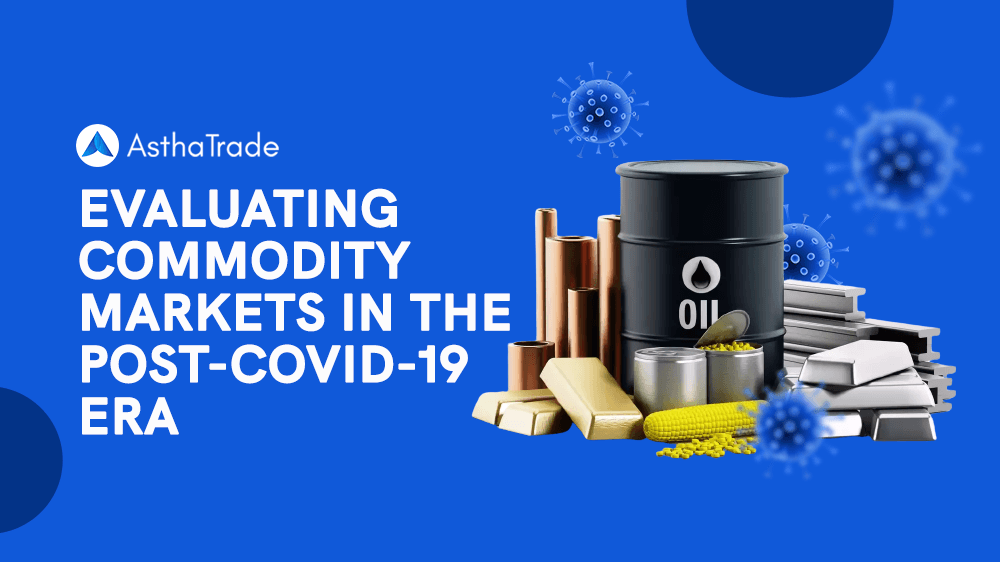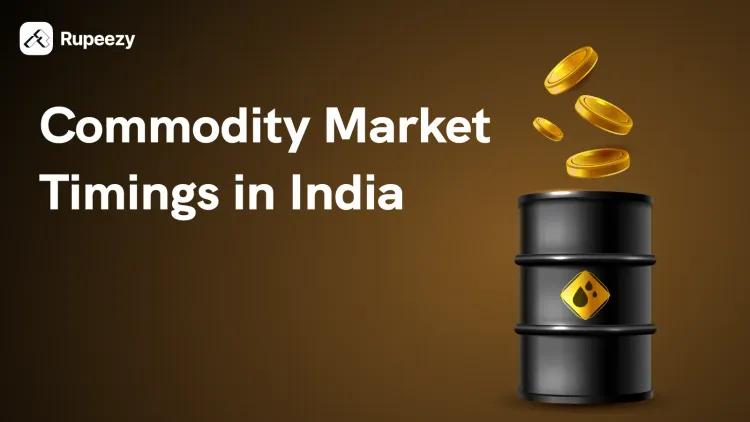What is FMC (Forward Markets Commission)?


00:00 / 00:00
Have you ever wondered who ensures fairness and transparency in India’s commodity markets? The FMC is the regulatory body overseeing the commodity derivatives market in India. It was established to bring order to a previously unregulated sector that was prone to unethical practices and lacked investor protection. Its main role was to regulate commodity markets.
In this article, we will delve into the history of the FMC, its key roles and responsibilities, the challenges it faced, and the merger with SEBI in 2015. By the end, you’ll have a clear understanding of how the FMC influenced India’s commodity markets and how the current regulatory framework functions today. Continue reading to find out how India's commodity market regulation has changed throughout time.
What is FMC?
FMC full form stands for Forward Market Commission. They were one of the statutory regulating agencies in charge of the Indian commodity derivatives market. It was established in 1953 under the Forward Contracts (Regulation) Act (FCRA) of 1952 and was under the Ministry of Consumer Affairs, Food, and Public Distribution. In India, the FMC is the primary regulator of the commodity derivatives market. They provide information to the government about the FCRA's administration and any obstacles to commodity trading. Additionally, the FMC collects and publishes information about the trading conditions of commodities covered by the Act.
Why India Needed the FMC?
Before the FMC's establishment in 1953, India's commodity market was largely unregulated, with a system of self-regulatory bodies. The key reasons for the necessity of such a regulating agency are as follows:
To ensure that market participants, exchanges, and intermediaries follow transparent and ethical trading practices, rules and regulations must be established.
To protect investors' interests by monitoring unethical practices.
The FMC facilitates price discovery by providing a platform for buyers and sellers to trade futures contracts, thereby reducing price volatility and providing hedging opportunities.
Role of FMC in India’s Commodity Market
The FMC performed the following roles and responsibilities in India's commodity market and they are as follows:
Regulation and Supervision: The Forward Markets Commission's primary role is to regulate and supervise India's forward and commodity derivatives markets. This is to ensure that these markets are properly regulated and monitored in order to identify problems.
Prevents Fraudulent activities: Excessive speculation or market manipulation can dramatically raise commodity prices. The FMC is responsible for preventing market manipulation, price rigging, and other irregularities and for taking the necessary actions to ensure a fair trading environment.
Issuing Guidelines and Investor Protection: The FMC issues guidelines that address various aspects of the forwards market's organisation and workflow, as well as protecting market participants' interests by establishing standards for disclosure, risk management, and dispute resolution. Additionally, it teaches investors about the advantages and disadvantages of trading in the futures market.
Ensure Transparency: The FMC in India promotes transparency by providing market participants and the government with clear and accurate information on time. Additionally, it guarantees ethical trading in the commodities market of India.
Licensing and Registration: The Forward Market Commission of India is in charge of granting licenses to commodity exchanges, clearing house corporations, and futures trading intermediaries. The FMC also registers market participants like brokers and traders.
Major Exchanges Regulated by the FMC
As we looked into some of the key roles of the FMC, we will look at some of the major exchanges that operated under the regulatory oversight of the Forward Markets Commission (FMC):
SL No | Exchanges |
1 | Multi Commodity Exchange (MCX) |
2 | National Multi-Commodity Exchange (NMCE) |
3 | National Commodity and Derivatives Exchange (NCDEX) |
4 | Indian Commodity Exchange Ltd (ICEX) |
5 | ACE Derivatives and Commodity Exchange |
The above-listed exchanges regulate forward trading across 113 commodities in the commodities sectors like agriculture, metals, and energy. In addition to the above table, 16 commodity-specific exchanges are FMC-approved under the Forward Contracts (Regulation) Act, 1952, to oversee trade in specific regional commodities.
Commodities Regulated by FMC
Here are some of the key categories and their commodities that were traded on FMC-regulated exchanges:
Commodity Category | Major Commodities |
Edible Oilseeds | Groundnut, mustard seed, cottonseed, sunflower, soy oil, and rice bran oil. |
Food Grains | Wheat, gram, lentils, bajra and maize |
Metals | Gold, Silver, copper, zinc, lead |
Fibres | Cotton and jute |
Spices | Turmeric, pepper and cumin |
Margin Trading Facility (MTF) in Commodity Markets:
Traders could also leverage Margin Trading Facility (MTF) to take larger positions in commodity futures while only putting up a fraction of the capital. While MTF amplified potential gains, it also increased the risk of losses, highlighting the need for disciplined risk management.
Challenges Faced by FMC
The FMC was encountering a number of obstacles that hindered its capacity to efficiently oversee India's commodities markets. The following points highlight some of these key challenges:
The regulatory agency faced difficulties since the FMC needed improved compliance and enforcement mechanisms.
For agricultural commodities, speculation is difficult to control, resulting in significant price differences.
Instances of price manipulation may occur since the FMC does not control commodity spot prices.
Some commodity segments face issues with low liquidity and a lack of participation, which limits their growth and stability. FMC needs to drive market participation and promote liquidity by launching innovative products and market-making measures.
The lack of awareness among market participants, particularly farmers and small traders, are unaware of the benefits of trading futures contracts. FMC should educate and increase awareness regarding risk management and price discovery processes.
Why did FMC merge with SEBI?
On 28th September, 2015, the Indian government decided to merge the Forward Markets Commission (FMC) with the Securities and Exchange Board of India. This merger was proposed by Finance Minister Arun Jaitley during the Union Budget 2015-16.
The stock and commodity markets were governed independently before the merger, with FMC managing commodities and SEBI managing securities. However, the FMC had limited enforcement powers and outdated tools and struggled to keep up with the growing complexity of the commodity futures markets.
To address this issue, the government decided to merge FMC with SEBI, which had a stronger legal framework, better resources, and more experience regulating modern financial markets. The merger resulted in improved investor protection and risk management measures, as well as increased commodity market surveillance and monitoring.
The Impact of the Merger on Commodity Markets
The merger of FMC with SEBI brought a noticeable impact on the commodity market. Here are the key impacts listed below:
Commodity exchanges must comply with stricter regulatory requirements.
Commodity options are one of the new financial instruments that have been introduced.
Risk mitigation measures benefited both traders and hedgers.
The number of foreign investors participating in India's commodity markets increased.
Who regulates India’s Commodity Market Today?
The Securities and Exchange Board of India (SEBI) is in charge of regulating the commodities markets in India. Until September 28, 2015, the Forward Markets Commission (FMC) regulated India's commodity futures market. The FMC and SEBI collaborated to improve commodity futures market regulation. In India, commodity derivative trading is currently governed by SEBI. Furthermore, the Warehousing Development and Regulatory Authority (WDRA) collaborates with SEBI to monitor the storage of physical commodities associated with derivative contracts.
Conclusion
The Forward Markets Commission was instrumental in establishing structure and fairness in India's commodity markets. Its merger with SEBI indicates a new era of more robust, unified regulation. When the FMC merged with SEBI in 2015, the process was streamlined to bring significant change to the Indian commodity market. As SEBI regulates the market, the FMC's values of integrity, investor protection, and transparent markets continue to shape how India trades and invests.
FAQs
Q. What is the Forward Market Commission?
It is a regulatory body that governs India's commodity and derivatives (futures) markets.
Q. Where is the Forward Markets Commission headquarters?
Forward Markets Commission's (FMC) headquarters are located in Mumbai, Maharashtra.
Q. What is the purpose of the forward market?
The forward market's primary purpose is to buy and sell future delivery contracts on a marketplace for hedging or speculating.
Q. What is the FMC in Derivatives?
The Forward Market Commission (FMC) is the regulatory body in charge of overseeing and regulating India's commodity and futures derivatives market.
Check Out These Related Articles |
The content on this blog is for educational purposes only and should not be considered investment advice. While we strive for accuracy, some information may contain errors or delays in updates.
Mentions of stocks or investment products are solely for informational purposes and do not constitute recommendations. Investors should conduct their own research before making any decisions.
Investing in financial markets are subject to market risks, and past performance does not guarantee future results. It is advisable to consult a qualified financial professional, review official documents, and verify information independently before making investment decisions.

All Category









